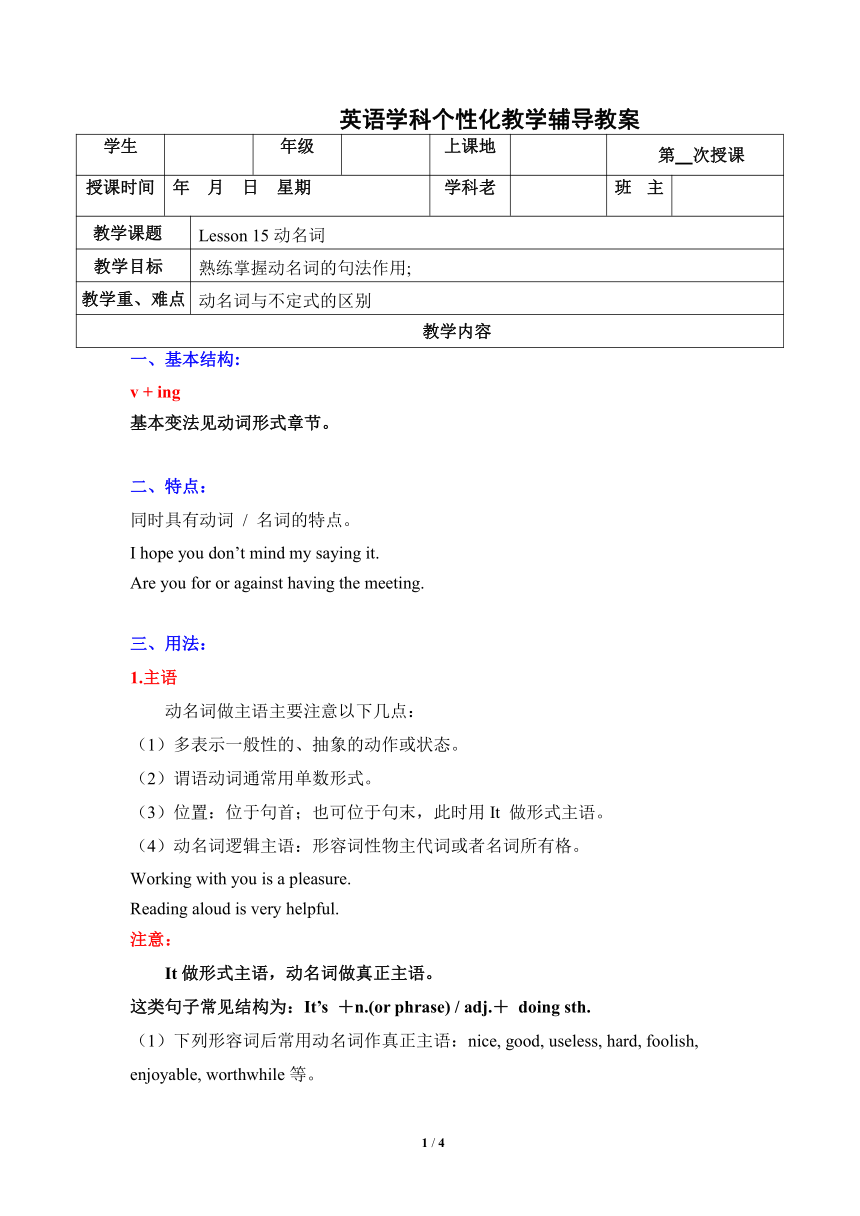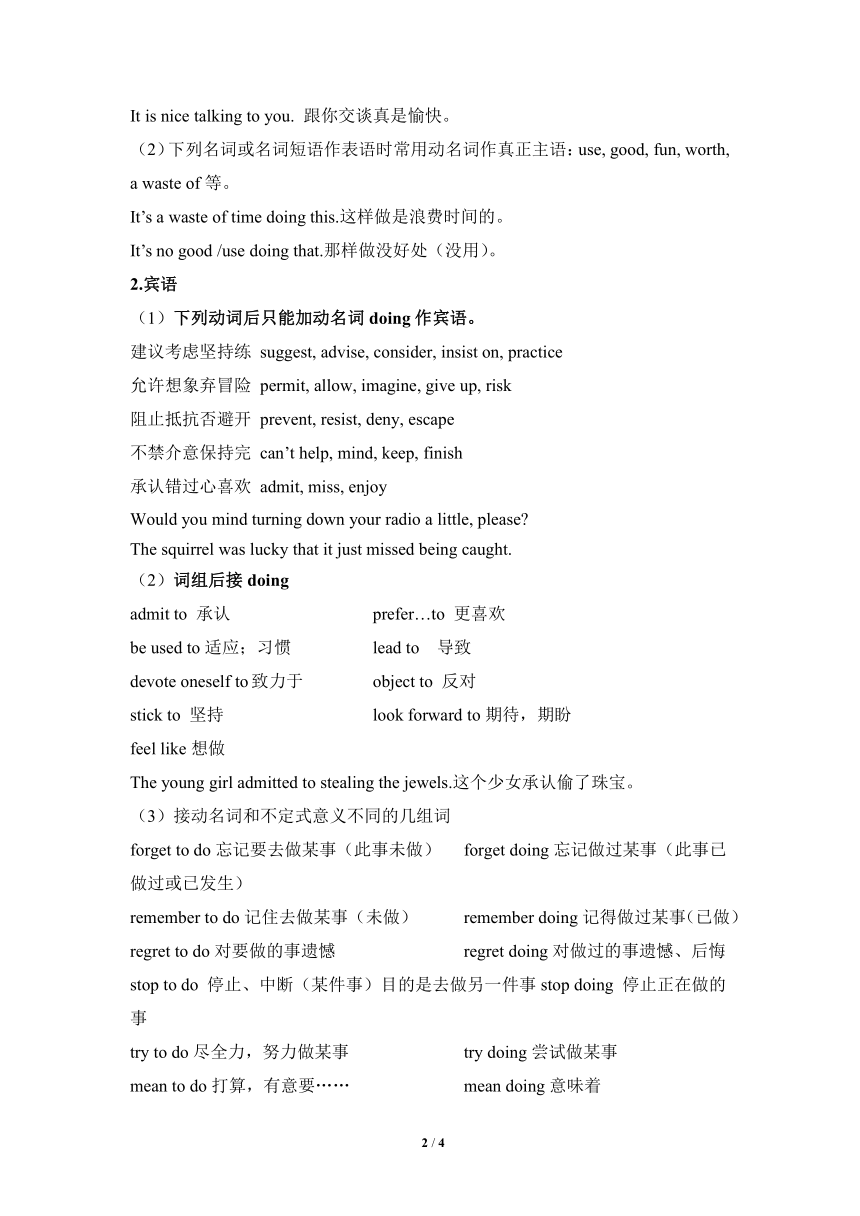2022年中考英语语法专题-第15讲动名词教案(word版)
文档属性
| 名称 | 2022年中考英语语法专题-第15讲动名词教案(word版) |

|
|
| 格式 | docx | ||
| 文件大小 | 23.4KB | ||
| 资源类型 | 教案 | ||
| 版本资源 | 通用版 | ||
| 科目 | 英语 | ||
| 更新时间 | 2022-01-19 08:50:18 | ||
图片预览


文档简介
英语学科个性化教学辅导教案
学生 年级 上课地点 第 次授课
授课时间 年 月 日 星期 学科老师 班主任
教学课题 Lesson 15动名词
教学目标 熟练掌握动名词的句法作用;
教学重、难点 动名词与不定式的区别
教学内容
一、基本结构:
v + ing
基本变法见动词形式章节。
二、特点:
同时具有动词 / 名词的特点。
I hope you don’t mind my saying it.
Are you for or against having the meeting.
三、用法:
1.主语
动名词做主语主要注意以下几点:
(1)多表示一般性的、抽象的动作或状态。
(2)谓语动词通常用单数形式。
(3)位置:位于句首;也可位于句末,此时用It 做形式主语。
(4)动名词逻辑主语:形容词性物主代词或者名词所有格。
Working with you is a pleasure.
Reading aloud is very helpful.
注意:
It做形式主语,动名词做真正主语。
这类句子常见结构为:It’s +n.(or phrase) / adj.+ doing sth.
(1)下列形容词后常用动名词作真正主语:nice, good, useless, hard, foolish, enjoyable, worthwhile等。
It is nice talking to you. 跟你交谈真是愉快。
(2)下列名词或名词短语作表语时常用动名词作真正主语:use, good, fun, worth, a waste of等。
It’s a waste of time doing this.这样做是浪费时间的。
It’s no good /use doing that.那样做没好处(没用)。
2.宾语
(1)下列动词后只能加动名词doing作宾语。
建议考虑坚持练 suggest, advise, consider, insist on, practice
允许想象弃冒险 permit, allow, imagine, give up, risk
阻止抵抗否避开 prevent, resist, deny, escape
不禁介意保持完 can’t help, mind, keep, finish
承认错过心喜欢 admit, miss, enjoy
Would you mind turning down your radio a little, please
The squirrel was lucky that it just missed being caught.
(2)词组后接doing
admit to 承认 prefer…to 更喜欢
be used to适应;习惯 lead to 导致
devote oneself to 致力于 object to 反对
stick to 坚持 look forward to期待,期盼
feel like想做
The young girl admitted to stealing the jewels.这个少女承认偷了珠宝。
(3)接动名词和不定式意义不同的几组词
forget to do忘记要去做某事(此事未做) forget doing忘记做过某事(此事已做过或已发生)
remember to do记住去做某事(未做) remember doing记得做过某事(已做)
regret to do对要做的事遗憾 regret doing对做过的事遗憾、后悔
stop to do 停止、中断(某件事)目的是去做另一件事stop doing 停止正在做的事
try to do尽全力,努力做某事 try doing尝试做某事
mean to do打算,有意要…… mean doing意味着
go on to do 继而(去做另外一件事情) go on doing 继续(原先没有做完的事情)
used to do … 过去做某事 be used to doing … 习惯做某事
(4)动词 “like, love, hate, prefer”后接动名词表示“习惯性动作”,后接不定式表示“心理或一次具体动作”。当用在should, would之后时,只跟不定式。
I like swimming, but I don’t like to swim this afternoon.
What would you like to eat tonight
(5)need, want, require, worth动名词表被动意义。
The room needs cleaning.
The book is well worth reading.
3.宾补
(1)see / watch / notice / hear / find sb. doing sth.强调动作正在进行。
see / watch / notice / hear / find sb. do sth. 强调动作发生的事实。
(2)keep sb. doing sth.让某人做某事。
4.作定语
动名词做定语时常置于被修饰词之前,用于说明事物的用途或者性能。
a walking stick =a stick for walking
a washing machine=a machine for washing
a reading room=a room for reading
sleeping pills=pills for sleeping
5.作表语
动名词作表语虽是用于回答主语“是什么”的,作表语强调的是一般性、抽象的、经常发生的动作。
His job is teaching the students.
My favorite sport is swimming.
6.动名词的时态和语态
如果要表示动名词代表的动作在谓语所表示的动作之前发生,通常用动名词的完成形式。
He didn’t mention having met me.
I regret not having taken her advice.
I don’t remember having ever promised you that.
当一个动名词逻辑上的主语所表示的是这动作的承受者时,这个动名词一般要用被动形式。
He did it without being asked.
They couldn’t stand being treated like that.
如果表示的动作在谓语表示的动作之前发生,有时需要用动名词的完成被动形式, 如:
I don’t remember having ever been given a chance to try this method. 2 / 2
学生 年级 上课地点 第 次授课
授课时间 年 月 日 星期 学科老师 班主任
教学课题 Lesson 15动名词
教学目标 熟练掌握动名词的句法作用;
教学重、难点 动名词与不定式的区别
教学内容
一、基本结构:
v + ing
基本变法见动词形式章节。
二、特点:
同时具有动词 / 名词的特点。
I hope you don’t mind my saying it.
Are you for or against having the meeting.
三、用法:
1.主语
动名词做主语主要注意以下几点:
(1)多表示一般性的、抽象的动作或状态。
(2)谓语动词通常用单数形式。
(3)位置:位于句首;也可位于句末,此时用It 做形式主语。
(4)动名词逻辑主语:形容词性物主代词或者名词所有格。
Working with you is a pleasure.
Reading aloud is very helpful.
注意:
It做形式主语,动名词做真正主语。
这类句子常见结构为:It’s +n.(or phrase) / adj.+ doing sth.
(1)下列形容词后常用动名词作真正主语:nice, good, useless, hard, foolish, enjoyable, worthwhile等。
It is nice talking to you. 跟你交谈真是愉快。
(2)下列名词或名词短语作表语时常用动名词作真正主语:use, good, fun, worth, a waste of等。
It’s a waste of time doing this.这样做是浪费时间的。
It’s no good /use doing that.那样做没好处(没用)。
2.宾语
(1)下列动词后只能加动名词doing作宾语。
建议考虑坚持练 suggest, advise, consider, insist on, practice
允许想象弃冒险 permit, allow, imagine, give up, risk
阻止抵抗否避开 prevent, resist, deny, escape
不禁介意保持完 can’t help, mind, keep, finish
承认错过心喜欢 admit, miss, enjoy
Would you mind turning down your radio a little, please
The squirrel was lucky that it just missed being caught.
(2)词组后接doing
admit to 承认 prefer…to 更喜欢
be used to适应;习惯 lead to 导致
devote oneself to 致力于 object to 反对
stick to 坚持 look forward to期待,期盼
feel like想做
The young girl admitted to stealing the jewels.这个少女承认偷了珠宝。
(3)接动名词和不定式意义不同的几组词
forget to do忘记要去做某事(此事未做) forget doing忘记做过某事(此事已做过或已发生)
remember to do记住去做某事(未做) remember doing记得做过某事(已做)
regret to do对要做的事遗憾 regret doing对做过的事遗憾、后悔
stop to do 停止、中断(某件事)目的是去做另一件事stop doing 停止正在做的事
try to do尽全力,努力做某事 try doing尝试做某事
mean to do打算,有意要…… mean doing意味着
go on to do 继而(去做另外一件事情) go on doing 继续(原先没有做完的事情)
used to do … 过去做某事 be used to doing … 习惯做某事
(4)动词 “like, love, hate, prefer”后接动名词表示“习惯性动作”,后接不定式表示“心理或一次具体动作”。当用在should, would之后时,只跟不定式。
I like swimming, but I don’t like to swim this afternoon.
What would you like to eat tonight
(5)need, want, require, worth动名词表被动意义。
The room needs cleaning.
The book is well worth reading.
3.宾补
(1)see / watch / notice / hear / find sb. doing sth.强调动作正在进行。
see / watch / notice / hear / find sb. do sth. 强调动作发生的事实。
(2)keep sb. doing sth.让某人做某事。
4.作定语
动名词做定语时常置于被修饰词之前,用于说明事物的用途或者性能。
a walking stick =a stick for walking
a washing machine=a machine for washing
a reading room=a room for reading
sleeping pills=pills for sleeping
5.作表语
动名词作表语虽是用于回答主语“是什么”的,作表语强调的是一般性、抽象的、经常发生的动作。
His job is teaching the students.
My favorite sport is swimming.
6.动名词的时态和语态
如果要表示动名词代表的动作在谓语所表示的动作之前发生,通常用动名词的完成形式。
He didn’t mention having met me.
I regret not having taken her advice.
I don’t remember having ever promised you that.
当一个动名词逻辑上的主语所表示的是这动作的承受者时,这个动名词一般要用被动形式。
He did it without being asked.
They couldn’t stand being treated like that.
如果表示的动作在谓语表示的动作之前发生,有时需要用动名词的完成被动形式, 如:
I don’t remember having ever been given a chance to try this method. 2 / 2
同课章节目录
- 词法
- 名词
- 动词和动词短语
- 动词语态
- 动词时态
- 助动词和情态动词
- 非谓语动词
- 冠词
- 代词
- 数词和量词
- 形容词副词及其比较等级
- 介词和介词短语
- 连词和感叹词
- 构词法
- 相似、相近词比较
- 句法
- 陈述句
- 一般疑问句和否定疑问句
- 特殊疑问句及选择疑问句
- 反意疑问句
- 存在句(There be句型)
- 宾语从句
- 定语从句
- 状语从句
- 主谓一致问题
- 简单句
- 并列句
- 复合句
- 主谓一致
- 主、表语从句
- 名词性从句
- 直接引语和间接引语
- 虚拟语气
- 感叹句
- 强调句
- 倒装句
- 祈使句
- 句子的成分
- 句子的分类
- 题型专区
- 单项选择部分
- 易错题
- 完形填空
- 阅读理解
- 词汇练习
- 听说训练
- 句型转换
- 补全对话
- 短文改错
- 翻译
- 书面表达
- 任务型阅读
- 语法填空
- 其他资料
